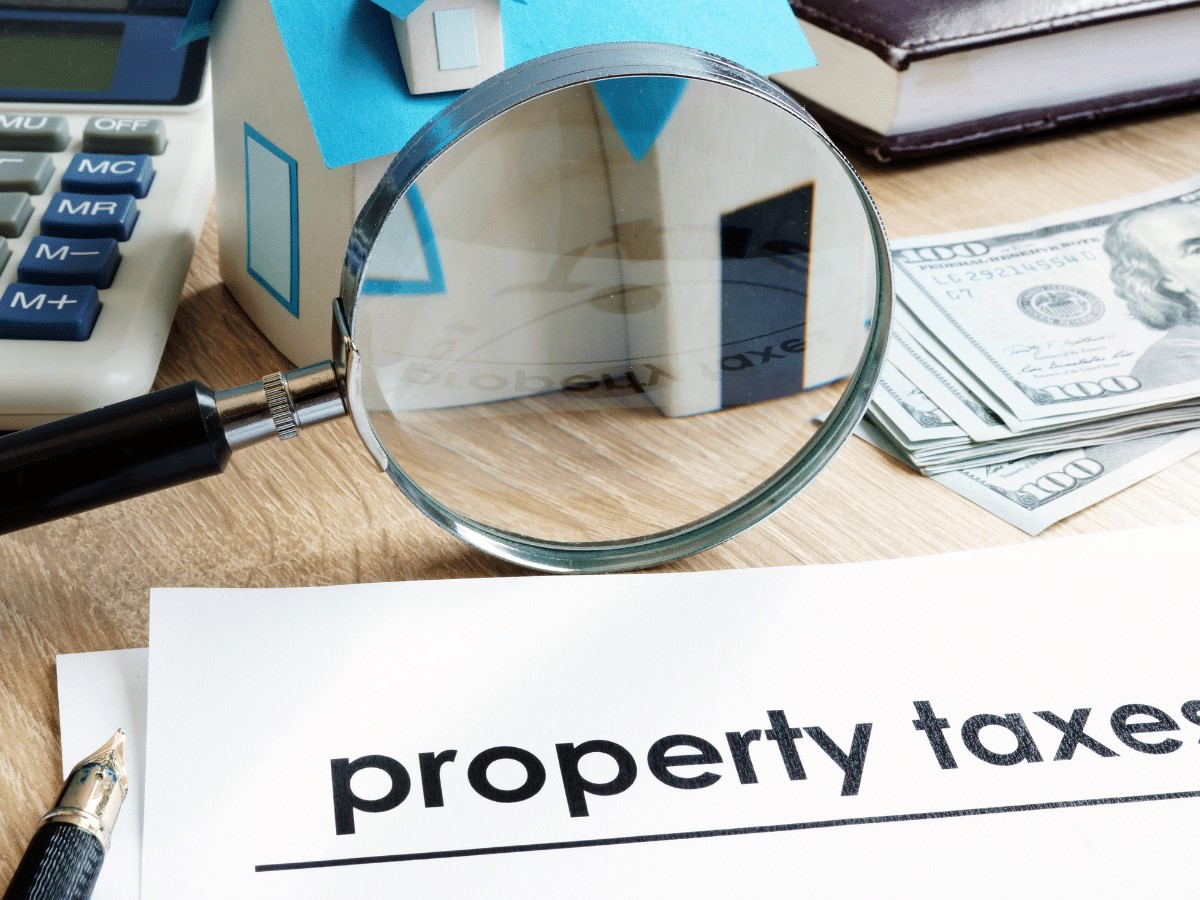Home>Home Maintenance>How Property Assessment Works In Washington State


Home Maintenance
How Property Assessment Works In Washington State
Modified: March 6, 2024
Learn how property assessment works in Washington State and discover the importance of home-maintenance for accurate valuations.
(Many of the links in this article redirect to a specific reviewed product. Your purchase of these products through affiliate links helps to generate commission for Storables.com, at no extra cost. Learn more)
Introduction
Welcome to our comprehensive guide on property assessment in Washington State. Whether you are a homeowner, real estate investor, or simply curious about how property values are determined, this article will provide valuable insights into the assessment process. Property assessment plays a crucial role in determining the fair market value of a property, which in turn affects property taxes and other related aspects.
Understanding how property assessment works is essential for homeowners to ensure their property is assessed accurately and fairly. Additionally, having a clear understanding of the assessment process can help property owners navigate any potential appeals or disputes.
In Washington State, property assessment is carried out by the County Assessor’s office, which determines the value of each property within their jurisdiction. The assessment process takes into account various factors, such as market value, location, property characteristics, and sales analysis.
This article will take a closer look at the property assessment process in Washington State, including the role of the County Assessor’s office, the factors considered in property assessment, and how property taxes are calculated based on the assessed value.
So, whether you’re a homeowner interested in understanding the value of your property, or you’re simply looking to gain insights into the assessment process, let’s dive into the world of property assessment in Washington State.
Key Takeaways:
- Property assessment in Washington State determines property value for taxes. Factors like location, size, and recent sales are considered. Understanding this process helps homeowners and investors make informed decisions.
- Property owners can appeal their assessment if they believe it’s unfair. The assessed value and tax rate determine property taxes. Understanding this process empowers property owners to manage their tax obligations effectively.
Read more: When To Plant Grass In Washington State
Understanding Property Assessment
Property assessment is the process of determining the value of a property for tax purposes. It involves the evaluation of various factors that contribute to the overall worth of the property. These factors can include the property’s location, size, condition, amenities, and recent sales of comparable properties in the area.
The main objective of property assessment is to ensure that the value assigned to a property for taxation purposes reflects its fair market value. This helps to maintain equity among property owners and distribute the tax burden fairly. The assessed value of a property is used to determine the amount of property taxes that the owner must pay to the local government or municipality.
Property assessment is an essential part of the taxation system as it helps to generate revenue for public services and infrastructure development. The funds collected from property taxes are used to finance schools, road maintenance, public safety, and other community services.
Accurate property assessment is crucial to ensure that no property owner pays more or less than their fair share of taxes. It also helps to prevent tax evasion by ensuring that properties are assessed fairly and consistently across the board.
For homeowners, property assessment provides a basis for understanding the value of their property in the current market. It can also help them make informed decisions regarding refinancing, selling, or renovating their property. Additionally, property assessment can affect homeowners’ insurance premiums and potential property resale value.
Real estate investors and developers rely on property assessment to evaluate the potential profitability of a property. By understanding the assessed value, they can assess the feasibility of investment opportunities and make informed decisions about purchasing or developing properties.
Overall, property assessment plays a crucial role in the economic, financial, and regulatory aspects of owning, buying, and selling properties. It ensures transparency, fairness, and accuracy in property valuation, which ultimately benefits both property owners and the community as a whole.
Property Assessment Process in Washington State
The property assessment process in Washington State involves several steps to determine the value of a property accurately. Let’s take a closer look at the key components of this process.
Overview of the Assessment Process
The assessment process begins with the County Assessor’s office identifying and reviewing all taxable properties within their jurisdiction. They collect and maintain data on each property, including ownership information, property characteristics, and recent sales data.
The County Assessor’s office uses this information to assess the value of each property based on market conditions and other relevant factors.
Initial Assessment
During the initial assessment, the County Assessor’s office assigns a value to each property based on the information they have on file. This value is known as the assessed value.
The assessed value is determined using various methods, such as the cost approach, sales comparison approach, or income approach. These methods help to estimate the property’s fair market value by considering factors such as construction costs, recent sales of similar properties, and potential income generated by the property.
Read more: How To Read A Property Assessment
Property Valuation
Property valuation involves analyzing various factors to determine the fair market value of a property. This includes considering factors such as the property’s location, size, condition, amenities, and other characteristics that contribute to its worth.
The County Assessor’s office may also take into account recent sales data of comparable properties in the area. This helps to ensure that properties are assessed fairly and accurately compared to similar properties in the market.
Appeals Process
If property owners believe that their assessed value is incorrect or unfair, they have the option to appeal the assessment. The appeals process allows property owners to present their case and provide evidence supporting their claim of an incorrect valuation.
Property owners must file an appeal within a specified time frame, typically within 30 to 60 days of receiving their assessment notice. The appeal process varies by county, but generally involves submitting a written appeal to the County Assessor’s office and providing supporting documentation, such as recent property appraisals or sales data.
After reviewing the appeal, the County Assessor’s office may reassess the property value or provide a response explaining the reasons for upholding the original assessment. If the property owner disagrees with the outcome, they may further appeal the decision to a local assessment appeals board or even to the Superior Court.
It’s important for property owners to familiarize themselves with the appeals process and understand the specific requirements and deadlines set by their county. Engaging the services of a qualified real estate appraiser or tax attorney can also be valuable in building a strong case during the appeals process.
Understanding the assessment process and the available avenues for appeal can help property owners ensure that their property is assessed accurately and fairly, ultimately impacting their property tax obligations.
Factors Considered in Property Assessment
When assessing the value of a property, the County Assessor’s office in Washington State takes into account several key factors. These factors help determine the fair market value of the property for taxation purposes. Let’s explore the main considerations in property assessment.
Market Value
The market value of a property is one of the most important factors considered during the assessment process. Market value is the estimated price that a property would fetch in the open market, assuming both buyer and seller are knowledgeable and willing, and that there is a reasonable amount of time for the property to be marketed.
The County Assessor’s office analyzes recent sales of similar properties in the area to assess the market value of a property. They take into account factors such as location, property characteristics, and recent market trends to determine a fair market value for the property.
Read more: What Is Property Assessment Profile
Location
The location of a property significantly influences its value. The County Assessor’s office considers factors such as the neighborhood, proximity to amenities and services, access to transportation, and school district when assessing the value of a property.
In areas with high demand and limited supply, properties tend to have higher assessed values. On the other hand, properties located in areas with lower demand or unfavorable conditions may be assigned lower values.
Property Characteristics
The physical characteristics of a property are also taken into account during the assessment process. These can include the size of the lot, square footage of the building, number of bedrooms and bathrooms, architectural features, and overall condition of the property.
The County Assessor’s office evaluates these characteristics to estimate the value of the property. For example, a larger lot size or additional amenities, such as a swimming pool or a garage, may lead to a higher assessed value.
Sales Analysis
An important part of property assessment is the analysis of recent sales of comparable properties in the area. This sales analysis helps to establish a benchmark for property values and ensures that properties are being assessed fairly in relation to similar properties.
The County Assessor’s office considers factors such as the sales price, date of sale, property condition, and adjustments for differences between the subject property and the comparables. By analyzing these sales, they can determine the appropriate value for a property based on market trends and the overall real estate market conditions.
By considering market value, location, property characteristics, and sales analysis, the County Assessor’s office in Washington State aims to provide accurate and fair assessments for all properties within their jurisdiction. Property owners can use this information to better understand how their property’s value is determined and how it compares to similar properties in the market.
Role of County Assessor’s Office
The County Assessor’s office plays a vital role in the property assessment process in Washington State. This office is responsible for assessing the value of all taxable properties within their jurisdiction. Let’s explore the various roles and functions of the County Assessor’s office.
Read more: What Are Property Assessment Caps
Responsibility of County Assessor
The County Assessor is an elected official who oversees the assessment process in their respective county. Their primary responsibility is to ensure that all properties are assessed fairly and accurately, in accordance with state laws and guidelines.
The County Assessor is responsible for maintaining property records, data collection, and analysis, determining property values, and administering exemptions and special assessments. They work to ensure compliance with state regulations and assess properties based on market conditions and other relevant factors.
Assessment Department Functions
The Assessment Department within the County Assessor’s office performs various functions related to property assessment. Some of the key functions include:
- Collecting property information: The Assessment Department collects data on all taxable properties within the county. This includes ownership information, property characteristics, recent sales data, and any exemptions or special assessments that may apply.
- Property valuation: Using the collected data, the Assessment Department determines the assessed value of each property. They utilize valuation methods and analysis to estimate the fair market value based on market conditions and other relevant factors.
- Property record maintenance: The Assessment Department is responsible for maintaining accurate and up-to-date property records. This includes updating ownership information, tracking changes to the property, and handling any appeals or disputes related to assessment values.
- Exemptions and special assessments: The Assessment Department administers exemptions for properties that qualify for tax breaks, such as properties used for charitable, religious, or government purposes. They also handle special assessments for properties that benefit from specific public improvements.
Assessor’s Office Contact Information
If property owners have questions or need assistance regarding property assessment, they can contact their local Assessor’s office. Each county has its own Assessor’s office, and contact information can typically be found on the county’s official website.
Property owners can reach out to the Assessor’s office to inquire about their property assessment, understand the appeals process, obtain information about exemptions or special assessments, or seek guidance on any other related matter.
It is advisable to have the property information, such as the parcel number or property address, readily available when reaching out to the Assessor’s office to ensure efficient communication and accurate information exchange.
By understanding the role and responsibilities of the County Assessor’s office, property owners can engage with the office more effectively and gain a better understanding of the property assessment process in Washington State.
Property Assessment Appeals
Property owners in Washington State have the right to file an appeal if they believe their property assessment is incorrect or unfair. The appeals process provides an opportunity for property owners to present their case and seek a reassessment of their property value. Let’s explore the reasons for filing an appeal, the steps involved, and the hearing and decision process.
Reasons for Filing an Appeal
There are several reasons why property owners may choose to file an appeal against their property assessment. Some common reasons include:
- Disagreement with the assessed value: The property owner believes that the assessed value assigned by the County Assessor’s office is inaccurate or inconsistent with the fair market value of the property.
- Inequality compared to similar properties: The property owner believes that their property is assessed unfairly when compared to similar properties in the area, indicating an inconsistency in the assessment process.
- Errors or omissions in property data: The property owner identifies errors or omissions in the property information used for the assessment, such as incorrect square footage or missing property features.
- Changes in property conditions: The property owner can demonstrate that significant changes affecting the property’s value have occurred, such as damage from a natural disaster or substantial renovations that were not considered in the assessment.
Steps to File an Appeal
To initiate the appeals process, property owners must follow certain steps:
- Review the assessment notice: Property owners should carefully review the assessment notice they receive from the County Assessor’s office. The notice typically includes information on how to file an appeal and the deadline to do so.
- Gather supporting documentation: Property owners should collect relevant supporting documentation to strengthen their case. This may include recent property appraisals, comparable sales data, or documentation showing errors or changes in property conditions.
- Complete the appeal form: Property owners must complete and submit the appeal form provided by the County Assessor’s office. The form typically requires basic property information, the reason for the appeal, and supporting documentation.
- Submit the appeal within the deadline: Property owners must ensure that they submit their appeal within the specified timeframe, usually within 30 to 60 days of receiving the assessment notice. Late filings may not be considered.
Hearing and Decision Process
Once the appeal is filed, it goes through a hearing and decision process:
- Hearing scheduling: The County Assessor’s office will schedule a hearing to review the appeal. The property owner will receive notice of the hearing date and time.
- Presenting the case: During the hearing, the property owner has the opportunity to present their case, providing evidence and supporting documentation to support their claims of an incorrect assessment.
- Assessor’s response: The County Assessor’s office will review the appeal and supporting documentation provided by the property owner. They may choose to agree with the appeal and adjust the assessed value accordingly, or they may provide a response explaining the reasons for upholding the original assessment.
- Further appeals: If the property owner disagrees with the decision made by the County Assessor’s office, they may have the option to file additional appeals with a local assessment appeals board or even take the matter to the Superior Court.
It is important for property owners to familiarize themselves with the specific appeals process and deadlines established by their county. Engaging the services of a qualified real estate appraiser or tax attorney can also be beneficial in building a strong case and navigating the appeals process effectively.
By understanding the reasons for filing an appeal, the steps involved, and the hearing and decision process, property owners can exercise their rights and seek a fair resolution if they believe their property assessment is incorrect or unfair.
Property Tax Calculation
Property taxes are an essential source of revenue for local governments and are calculated based on the assessed value of a property. Understanding how property assessment contributes to tax calculation, the determination of tax rates, and the calculation of property taxes can help property owners better comprehend their tax obligations. Let’s explore these aspects in detail.
Role of Property Assessment in Tax Calculation
Property assessment plays a fundamental role in the calculation of property taxes. The assessed value of a property is used as a basis for determining the amount of taxes that property owners are obligated to pay. The higher the assessed value, the higher the property taxes.
The County Assessor’s office assesses the value of a property based on factors such as market value, location, property characteristics, and sales analysis. The assessed value is then used in conjunction with the local tax rate to calculate property taxes.
Tax Rate Determination
The tax rate is another crucial component in property tax calculation. The tax rate is determined by local taxing authorities, such as counties, cities, school districts, and other local entities. These jurisdictions determine the tax rates based on their budgetary needs and the total assessed value of all properties within their jurisdiction.
The tax rate is expressed as a percentage and is applied to the assessed value to calculate the annual property tax liability. For example, if the tax rate is 1% and the assessed value of a property is $300,000, the annual property tax would amount to $3,000.
It is important to note that tax rates can vary among different jurisdictions and can change from year to year as local budgets and needs evolve. Property owners should take into consideration the potential impact of tax rate changes on their property tax obligations.
Calculating Property Taxes
To calculate property taxes, property owners can follow these steps:
- Obtain the assessed value: Property owners can find their property’s assessed value on the assessment notice received from the County Assessor’s office.
- Check the current tax rate: Property owners should verify the current tax rate for their jurisdiction, which can be found on the website of the local taxing authority or by contacting the tax office.
- Calculate the property tax: Multiply the assessed value by the tax rate expressed as a decimal (e.g., 1% = 0.01) to determine the annual property tax liability. For example, if the assessed value is $400,000 and the tax rate is 1.2%, the annual property tax would amount to $4,800.
Property taxes are typically paid in installments throughout the year, with due dates set by the local taxing authority. It is essential for property owners to be aware of these due dates to avoid penalties or interest charges.
It’s worth mentioning that property taxes can also be influenced by additional factors such as exemptions, special assessments, and any local levies or bond measures. These elements can affect the total tax liability for a property and may vary depending on the specific characteristics and circumstances of each property.
By understanding the role of property assessment in tax calculation, the determination of tax rates, and the calculation of property taxes, property owners can acquire a clearer understanding of their tax obligations and make timely and appropriate arrangements to fulfill their tax responsibilities.
Conclusion
Understanding property assessment is essential for homeowners and real estate investors in Washington State. The property assessment process, carried out by the County Assessor’s office, determines the value of properties for tax purposes and plays a vital role in the taxation system.
Property assessment takes into account various factors, including market value, location, property characteristics, and sales analysis. By considering these factors, the County Assessor’s office strives to provide accurate and fair assessments for all properties within their jurisdiction.
The appeals process allows property owners to challenge their property assessments if they believe they are incorrect or unfair. By filing an appeal, property owners can present their case and provide supporting evidence to seek a reassessment of their property value.
Property taxes are calculated based on the assessed value and the tax rate set by local taxing authorities. Property owners can calculate their property taxes by multiplying the assessed value by the tax rate expressed as a decimal.
Understanding the property assessment process, the appeals process, and how property taxes are calculated empowers property owners to make informed decisions and ensure fair treatment in the taxation system.
Therefore, whether you’re a homeowner seeking to understand the value of your property or a real estate investor evaluating investment opportunities, having a comprehensive understanding of property assessment in Washington State is crucial.
Remember, property assessment serves as the foundation for property taxes, contributes to fair tax distribution, and helps fund essential public services and infrastructure development in your community.
By staying informed, engaging with the County Assessor’s office when necessary, and being proactive in managing your property assessment and tax obligations, you can navigate the world of property assessment with confidence and peace of mind.
Frequently Asked Questions about How Property Assessment Works In Washington State
Was this page helpful?
At Storables.com, we guarantee accurate and reliable information. Our content, validated by Expert Board Contributors, is crafted following stringent Editorial Policies. We're committed to providing you with well-researched, expert-backed insights for all your informational needs.











0 thoughts on “How Property Assessment Works In Washington State”